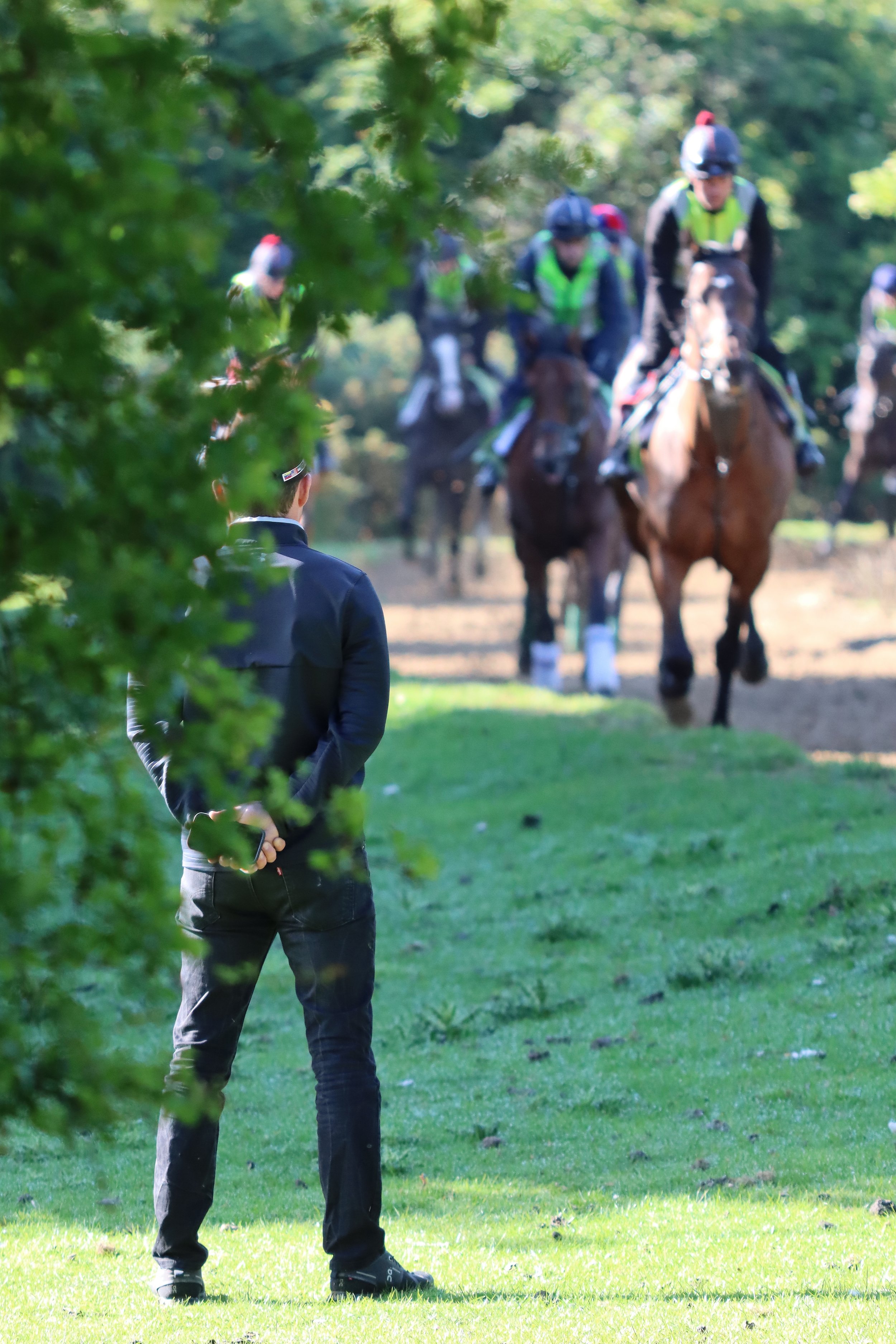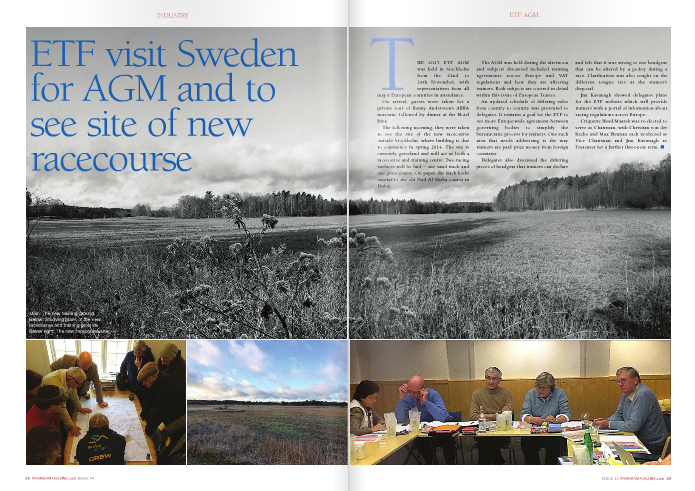“It’s a struggle…” The mental wellbeing of trainers and how to support them.
Article by Rupert Arnold
Training racehorses is a stressful occupation. There’s nothing wrong with that - until there is. In today’s world, mental health is front of stage in conversations about occupational health. Though horse racing might often appear to lag behind more progressive parts of society, attention is increasingly being focused on its participants’ capacity to withstand the stresses of a busy, challenging life where performance is in the public eye.
In Britain and Ireland, jockeys have been the first sector to benefit from support structures instigated by their trade associations and governing bodies. They have been encouraged to speak publicly about the causes of depression, anxiety and substance dependence, and in this way have begun to erode the stigma that stifles potentially healing conversations. A pathway has been opened for trainers to follow.
Three racing nations have spearheaded the research on trainers’ mental health. The first studies were conducted in Australia in 2008 by Speed and Anderson on behalf of Racing Victoria. It’s findings that “two-thirds of trainers never or rarely had one day off per week”, and “Trainers also face increased pressure from owners (e.g. pressure to win competitive races), shoulder the burden of responsibility for keeping horses healthy and sound, as well as financial difficulties” will strike a chord with trainers across all racing jurisdictions and sets the precedent for other research.
In July 2018, again in Australia, research on “Sleep and psychological wellbeing of racehorse industry workers” surveyed Australian trainers and found “Trainers reported significantly higher depression and anxiety scores compared with other racing industry workers, racehorse owners, and the general population. They had less sleeping hours and higher daytime dysfunction due to fatigue.”
Simone Seer’s University of Liverpool MBA dissertation of September 2018 “Occupational Stressors for Racehorse Trainers in Great Britain and their Impact on Health and Wellbeing” (supported by Racing Welfare) used qualitative research via unstructured interviews from which themes were analysed to identify patterns and differences between trainers’ experiences.
“Examples included business and finance worries, bureaucracy, the rules of racing, the fixture list, a lack of resources and busy work schedules, managing stressful episodes with racehorse owners and staff and in balancing emotions. The most dominant stressors were those that were felt to be out of a participant’s control and particularly related to racehorses: keeping horses healthy, free from injury, disease and illness, and the pressure to perform in relation to both the participant and their horses…participants were found to be engaged in intensive emotional labour combined with long work hours and busy schedules resulting in a ‘time famine’. All participants had experienced abusive messages by voicemail, email or social media.
“Participants reported mental ill health symptoms brought on by emotional toll, sleep deprivation, insomnia and isolation resulting in outcomes such as low self-esteem, depression, anxiety, low confidence and recurrent headaches.”
In 2021, following the watershed of the Covid-19 pandemic, research on Irish racehorse trainers by King et al published in the Journal of Equine Veterinary Science examined the “prevalence and risk factors” associated with racehorse trainer mental health. Among their headline findings were some familiar features:
“A prevalence of symptoms associated with common mental disorders was identified. Specifically, depression (41%), adverse alcohol use (38%), psychological distress (26%), and generalised anxiety (18%).
“Career dissatisfaction, financial difficulties, and lower levels of social support increased the likelihood of meeting the criteria for depression, psychological distress and generalised anxiety.”
As Ryan McElligott, Chief Executive of the Irish Racehorse Trainers Association, says: “Training is a tough business. Even the top trainers lose more often than they win. It’s extra competitive so fear keeps training fees down while costs are increasing…it’s a struggle.”
Away from the published science-based research, we must rely on anecdotes to get a picture of the experience of trainers in other European countries.
Perhaps surprisingly, no studies are available on the situation in France. Gavin Hernon, who represents the Association des Entraineur de Galop (AEDG) at the European Trainers Federation (ETF), suggests this may be because France Galop sees itself primarily as a regulator so wouldn’t include trainers’ health and well-being in its remit.
Gavin reports that trainers in France share the same pressures as colleagues in other countries. He says, “A major factor is the high financial cost of doing business. Well-funded prize money may cast a rosy glow across the sport, but this leads to trainers relying on their percentage to make a profit. It also gives them an incentive to own more horses than is the case in other countries. The combination becomes toxic if the horses are not winning, creating a culture of performance anxiety.”
According to Gavin, a common response to the occupational pressure is for trainers to shut themselves away and bottle up their true feelings. This belief is endorsed by Tom Luhnenschloss, the ETF representative in Norway. “Trainers are living in a bubble”, he explains. “Trainers have a certain mentality. Their life is very repetitive, they put their heads down and carry on, without sharing their problems. There are a lot of hidden issues.”
In the smallest racing nations, the subject of trainers’ mental health may not be enough of a priority for specific attention. Karin Lutmanova in the Czech Republic points out “The problem definitely exists, but I do not think anybody has capacity to care about it. Our racing has so many other crucial and elementary problems such as funding, closure of the main thoroughbred stud, and a decrease of racehorses and racing days.”
So there is a consensus that racehorse trainers are susceptible to particular forms of mental health conditions. The obvious follow-up question is, what can be done to support trainers facing these conditions?
At first glance, there seems to be a gap in racing’s provision for trainers. On governing body and charity websites it isn’t difficult to track down welfare/wellbeing support for jockeys and stable staff, less so for trainers. As Tom Lunhenschloss observed, “There is no one to catch you when you fall.” However, further investigation reveals that initiatives are underway.
From a European perspective, Britain and Ireland are adopting slightly different approaches.
Having contributed extensively to the research in Britain, the National Trainers Federation was keen to collaborate with Racing Welfare, the Jockey Club charity that aims to support the workforce of British racing and backed the research. Simone Sear’s paper concluded that “a bespoke, confidential service should be designed in order to support this workforce to gain insight and build resilience… and will need to provide support across a range of issues such as mental health, physical health, sports psychology, business management, HR and legal advice, financial assistance and time management.”
An informal arrangement between Racing Welfare and the NTF began in 2020 with referrals being made via both parties to Michael Caulfield, a sports psychologist with deep connections to horseracing through a previous role heading the Professional Jockeys Association. Racing Welfare also set up the Leaders Line, a centralised structure for supporting people in management positions. Neither of these initiatives achieved a breakthrough in terms of reach and recognition.
Drawing on Racing Foundation-funded research by Dan Martin at the Liverpool John Moores University, the NTF, through its charity Racehorse Trainers Benevolent Fund (RTBF), began working on a different approach inspired by Dan’s recommendation:
“Create a trainer-specific referral system, exclusive to trainers and separate from Racing Welfare, for mental health support. Given the multiple roles of the racehorse trainer, the support should provide organisational psychology, sports psychology, counselling, and clinical support. Former trainers should be considered to receive training to provide some of this support.”
The twist is that instead of building something and expecting the people to come, the RTBF model was about outreach – creating a network of knowledgeable and empathetic people to be visible in the trainer community, starting the conversations that trainers, by their own admission, were unlikely to reach out for on their own.
Michael Caulfield and David Arbuthnot, whose career as a trainer spanned 38 years and who later undertook counselling qualifications through the NTF Charitable Trust, were recruited to go out and about, chatting to trainers in the Lambourn training centre and surrounding area and at race meetings and bloodstock sales.
Harry Dunlop, a former trainer and recently recruited trustee of the RTBF, explains, “It’s well known that however serious the problem, taking that first step to ask for support with a mental health issue is hard to take. People are afraid to show what they perceive as weakness. By getting Caulfield and Arbuthnot into the places where trainers circulate in their daily working lives, we hope to break down barriers and give trainers a chance to share their problems. That might be all it takes to lighten the load. Or it might lead to scheduling a one-to-one at another time.”
Set up as a six-month pilot from July 2023, this initiative has already expanded to Yorkshire in the North and Newmarket, with trainers Jo Foster and Chris Wall respectively providing the support. Initial response from trainers was amused scepticism but this proved to be a superficial reaction. Very quickly, on a private and confidential basis, trainers have begun opening up to members of the support team. One-to-one sessions were scheduled. Trainers who admitted to putting off seeking help, contacted one of the team for a conversation. Thankfully, there has not been a rush of acute cases of serious mental health pathology. But there is clear evidence that “Trainers just want someone to talk to” as Michael Caulfield describes it. It’s worth noting that Caulfield warns against medicalising all the mental health conditions experienced by trainers. “There is a world of difference between a clinical mental illness such as schizophrenia or bipolar disorder, and being overwhelmed by the weight of responsibility and/or despair brought on by sheer exhaustion. Most of the time people need an outlet to vent their worries, and more sleep.”
The need for someone familiar to lend a friendly ear is confirmed by Ryan McElligott. “Trainers are a traditional cohort; they have rather conservative values. They don't like to admit they are in trouble; they worry that it's a sign of weakness. It's a close-knit community so generally the first call for help would be to people close to them.” McElligott says the Irish trainers are fortunate to have two sources of support – the Industry Assistance Programme, which gives access to counselling and therapy; and the availability of Jennifer Pugh, the Senior Medical Officer for the Irish Horseracing Regulatory Board. He describes her as “a prominent presence” at race meetings, and clearly trainers feel able to communicate with her.
Pugh contributed to the “prevalence and risk factor” paper mentioned above. She points out that with a background as an amateur rider, coming from a training family, and having worked as a racecourse doctor, she was already a recognisable person before taking on her present official role. The need for access to trusted figures appears to be a common factor in effective mechanisms of support.
The Industry Assistance Programme sits under the umbrella of Horse Racing Ireland’s EQUUIP service, described as ‘The People Behind the People’ in the Irish Horse Racing & Breeding Industry. One of its three offers is “health and wellbeing services for everyone who wants it.” As the British experience shows, encouraging trainers to make use of the formalised support system is not straightforward. Though predating EQUUIP’s creation, the Irish research indicated that “only a fifth of trainers had sought support for their personal and emotional problems.”
For this reason, Pugh endorses the social support approach. She says there is a plan to recruit wellbeing “champions” for people to approach out in the community. And having learned much more about trainers’ mental health through the strong communications established to manage racing’s response to the Covid pandemic, a programme of support is being worked on so that trainers’ needs are given the same importance as for jockeys and stable staff.
For a major racing nation comparatively rich in resources, some recognition of the psychological challenges facing trainers might be expected in France. After all, on its website France Galop lists “Ensuring the health of its professionals” in its responsibilities. It goes on to refer only to jockeys and stable staff. Other than redirecting fines levied on trainers under the disciplinary system towards support for retired trainers, France Galop makes no provision for the welfare of trainers. Furthermore, unlike Britain and Ireland, France Galop does not employ an official medical adviser, preferring to provide a list of authorised doctors. That said, this is a new policy area for everyone; France Galop is generally a first mover when it comes to policy initiatives so it can’t be long before a collaboration with the AEDG emerges.
This article has focussed on what we know about trainers’ mental health and ways to help them deal with the impact. What it does not address is the strategic question, how could the sport, the trainer’s business model and – as importantly – trainers’ professional development be structured differently to minimise the risks to trainers’ mental health and therefore reduce the need for intervention when things fall apart?
ETF AGM 2018
Click below to view
TO READ MORE —
BUY THIS ISSUE IN PRINT OR DOWNLOAD
WHY NOT SUBSCRIBE?
DON'T MISS OUT AND SUBSCRIBE TO RECEIVE THE NEXT FOUR ISSUES!
The 2009 European Trainers’ Federation AGM
The 2009 AGM was held at The Churchill Hotel in Portman Square, London in December. As always the AGM proved to be a useful forum to discuss issues from across Europe which affect trainers.










